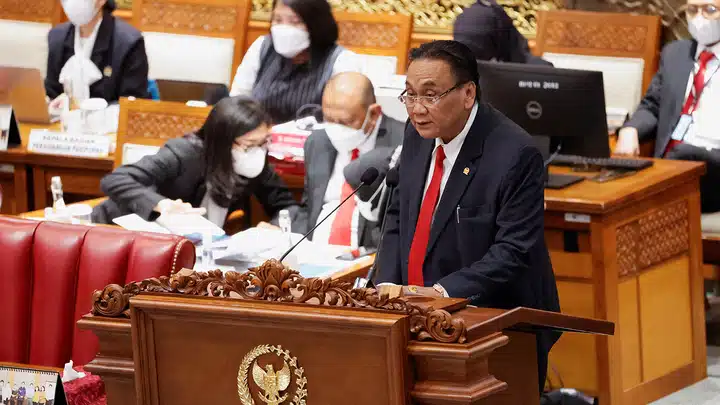The Indonesian Parliament passed a revision to the country’s penal code that criminalizes both domestic and international coercive sex, forbids the promotion of contraception, and outlaws disparaging the president and public figures

On Tuesday, the Indonesian Parliament enacted a long-awaited reform to the nation’s penal code that criminalizes sex other than marriage for both domestic and foreign parties, forbids the advertising of contraception, and outlaws disparaging the president and public figures.
The updated legislation preserves a five-year prison sentence for violating the core beliefs of Indonesia’s six officially recognized religions—Islam, Protestantism, Catholicism, Hinduism, Buddhism, and Confucianism—and also strengthens an existing blasphemy provision.
Associating with groups that uphold Marxist-Leninist philosophy carries a 10-year prison penalty while propagating communism carries a four-year imprisonment.
In accordance with a 2004 Practice Of medicine Law, the code preserves the previous illegality of abortion while adding exceptions for rape and women with existing medical conditions as long as the fetus is much less than 12 weeks old.
Rights organizations worried that adding some of the amendments to the code could punish common actions, endanger freedom of expression, and violate privacy rights since they were seen as being unduly broad or ambiguous.
The passage was hailed as a win for the nation’s LGBTQ community by some campaigners, nevertheless. After a lengthy debate, MPs decided to drop a Muslim organization-proposed amendment that had made gay sex unlawful.

Despite appeals first, from National National Human Rights Commission and other organizations to abolish the death penalty, as dozens of other nations have done, the updated code also maintains the death sentence inside the criminal justice system. The death penalty does, however, have a probationary period under the new rule. Capital punishment will be altered to life in jail or 20 years in prison if the offender behaves well within a 10-year term.
Regulations in Indonesia provide that the president must approve legislation before it becomes law. However, if the president doesn’t sign it, it still goes into force after 30 days until he writes a regulation to override it.
Given the new code’s prolonged vetting process in Parliament, Joko Widodo is generally likely to sign it. However, the law is probably going to be implemented gradually over a period of at least 3 years, according to Edward Hiariej, deputy prime minister of humanitarian law.
It’s hard to complete in a year, he claimed, because many implementing regulations need to be developed.
According to the revised rule, cohabitation is punishable by six months in jail and having intercourse outside of marriage by a year, although accusations of adultery must be supported by police reports made by a spouse, parents, or child.
It reinstates the prohibition from disparaging the office of the president and vice-president, government organizations, or national philosophy. The president is required to report insults to a sitting president, which may result in up to 3 years in prison.
The penal code, a holdover from the Dutch colonial administration, had been dormant for decades as lawmakers in the largest Muslim-majority country in the world wrestled with how to conform its traditional culture and customs to the code. On August 17, 1945, Indonesia proclaimed its independence.

Prior updated legislation was ready to be passed in 2019, however, President Widodo pushed lawmakers to postpone a vote amid rising public criticism that sparked thousands of countrywide rallies. The legislation’s detractors claimed it had anti-minority discriminatory provisions and that the parliamentary branch lacked transparency.
Read More: Proposed Japanese Fertility Law Discriminates Against Lesbians, Single Women
As parliamentarians discussed the articles, Widodo gave the Law as well as Civil Liberties Minister Yasonna Laoly instructions to solicit feedback from diverse groups.
The bill was prepared by a parliamentary task force in November, and MPs unanimously passed it on Tuesday, which Laoly hailed as “a historic step.”
Even though this world no longer intends to be using colonial items, Laoly noted in a press conference that it “turns out that this is not simple for us to pull free from the imperial living legacy.”
Finishing this procedure proves that it is never too late to create rules on our own, Laoly remarked, even 76 years after Dutch Criminal Code was incorporated as the Indonesian Crimes Act. “A nation’s civilization is reflected in its criminal code,”
Human Rights Watch stated on Tuesday that laws that punish criticizing public officials go against international law and that the mere fact that some types of communication are deemed offensive is not enough to warrant limits or punishments.

According to Andreas Harsono, a veteran Indonesian researcher at the organization, the risk of oppressive legislation is not that they will be imposed broadly but rather that they will open up opportunities for selective enforcement.
Many hotels, particularly those in popular tourist destinations like Bali or metropolitan Jakarta, run the danger of losing clients, he continued.
According to Harsono, “These laws allow police to demand bribes and let officials imprison political opponents, for example, using the blasphemy statute.”
Read More: Historic! The running regime in Iran has disbaned “MORALITY POLICE.”












